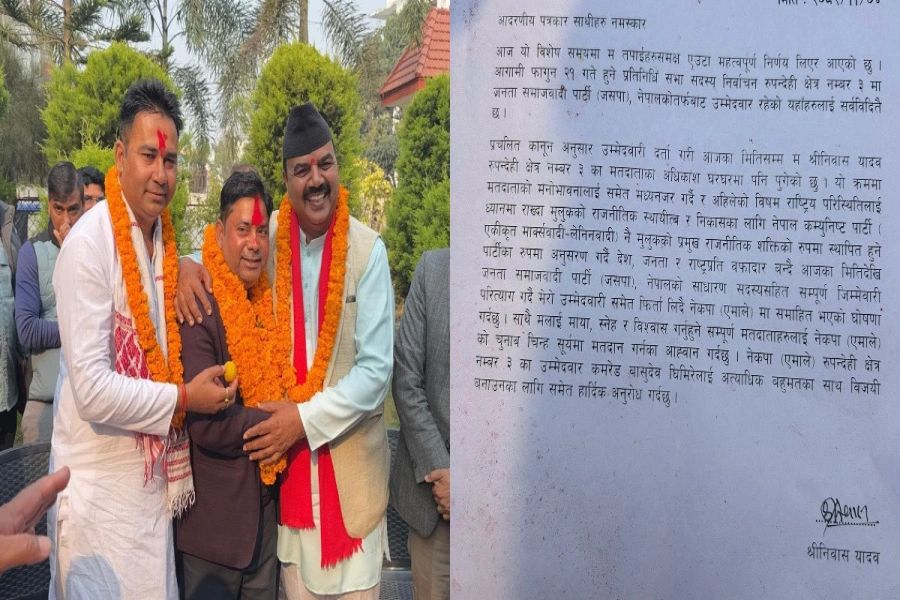"Nepal does not seem very keen on China's BRI. Despite Nepal signing the BRI, it only sent a delegation led by then deputy prime minister Krishna Bahadur Mahara at the Belt and Road Forum in May 2017 in Beijing.
-- Professor Jiang Yuechun, senior fellow at China Institute of International Studies
BEIJING, Sept 3: Chinese officials in Beijing and Kunming last week expressed skepticism over Nepal's intention to wholeheartedly endorse the Belt and Road Initiative (BRI). While many Chinese officials said they understood Nepal's tricky balancing act between India and China, they insisted that Nepal fully embraced BRI for its long-term prosperity. Moreover, frequent change of guard in Singha Durbar and the slow pace of implementation of agreed upon projects have left Chinese officials confused about Nepal's commitment to BRI (also called One Belt One Road or OBOR), China's $1 trillion project to connect peoples and economies in Asia, Europe and Africa.
Nepal-China agree to conclude BRI Implementation Plan 'soon' as...

"Nepal does not seem very keen on China's Belt and Road Initiative (BRI)," said Professor Jiang Yuechun, a senior fellow at China Institute of International Studies (CIIS), a think tank of China's Ministry of Foreign Affairs. Prof Jiang spoke to a group of Nepali journalists in Beijing last week. He said, "Despite Nepal signing the BRI, it only sent a delegation led by then deputy prime minister Krishna Bahadur Mahara at the Belt and Road Forum (BRF) in May 2017 in Beijing." More than 30 world leaders and senior officials from around the world attended the event. A total of 68 countries and international organizations have so far signed BRI agreements with China. Nepal and China signed a memorandum of understanding (MoU) on BRI on May 12, 2017 in Kathmandu.
Prof Guo Suiyan, deputy director of Yunnan Academy of Social Sciences, said Nepal could be an important link in establishing good relations between India and China. She also said China will adopt country-wise policy on BRI and won't expect the same response from the other country. Similarly, Prof Jiang from CIIS said Japan's take on BRI has influenced India's decision to not join the BRI. He further said both Japan and India will be part of BRI in the near future.
Countries like Pakistan have seen massive investments from China as part of BRI. The China-Pakistan economic corridor (often called Pakistan's Marshall Plan), which is currently valued at around $62 billion, is expected to create more than 2 million jobs in the next decade. The Chinese government has promised more than $350 million by 2030 for hydropower projects in Pakistan alone. Chinese companies like China Gezhouba Group have come forward aggressively in Nepal as well. The company signed an MoU in June 2017 to build the 1,200 MW Budhi Gandaki Hydropower Project, which they estimate will cost $2.5 billion and the company says it is determined to complete the project on time as they have the sole responsibility of engineering, procurement, construction and finance. Gezhouba officials in Beijing say they are already in talks with the Export-Import Bank of China (China Exim Bank) to finance the project.
Addressing concerns about project costs and loans that developing countries might have hard time paying back to China, CIIS officials talked about China's $15 billion fund for neighboring countries and especial priority for the 49 poorest countries. Moreover, CIIS officials say China is keen on setting up factories in Nepal's Special Economic Zones (SEZs), which in turn will boost the overall economy. They view setting up industries and massive investments from China will help increase overall productivity of countries like Nepal so it can be "win-win" for both China and Nepal. Chinese officials also acknowledge "some issues" with capital when it comes to investing in BRI and that they are "closely monitoring the situation in order to make the changes."
From private companies to state-owned industries, they are all determined to make BRI the central theme of their overseas investments. Companies like Energy China and Yunnan Energy Investment Group (YEIG) have been aggressively investing, bidding and working on projects in Asia and Africa on hydropower, railways, and roadways -- major focus of BRI. Gezhouba officials say they are excited to see Nepal including the Budi Gandaki project under BRI and their hope is that this will ensure adequate project financing and completion of the project on time.
Officials in Beijing and Kunming point to "thousands of years of historical relations" between Nepal and China. However, when it comes to Nepal and its commitment to BRI, China appears to be willing to wait and see Kathmandu's body language and the progress of the projects on the ground.







































